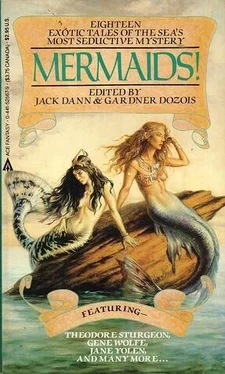Гарднер Дозуа - Mermaids!
Здесь есть возможность читать онлайн «Гарднер Дозуа - Mermaids!» весь текст электронной книги совершенно бесплатно (целиком полную версию без сокращений). В некоторых случаях можно слушать аудио, скачать через торрент в формате fb2 и присутствует краткое содержание. Год выпуска: 1986, ISBN: 1986, Издательство: Ace, Жанр: Фантастика и фэнтези, на английском языке. Описание произведения, (предисловие) а так же отзывы посетителей доступны на портале библиотеки ЛибКат.
- Название:Mermaids!
- Автор:
- Издательство:Ace
- Жанр:
- Год:1986
- ISBN:0-441-52567-9
- Рейтинг книги:5 / 5. Голосов: 1
-
Избранное:Добавить в избранное
- Отзывы:
-
Ваша оценка:
- 100
- 1
- 2
- 3
- 4
- 5
Mermaids!: краткое содержание, описание и аннотация
Предлагаем к чтению аннотацию, описание, краткое содержание или предисловие (зависит от того, что написал сам автор книги «Mermaids!»). Если вы не нашли необходимую информацию о книге — напишите в комментариях, мы постараемся отыскать её.
Mermaids! — читать онлайн бесплатно полную книгу (весь текст) целиком
Ниже представлен текст книги, разбитый по страницам. Система сохранения места последней прочитанной страницы, позволяет с удобством читать онлайн бесплатно книгу «Mermaids!», без необходимости каждый раз заново искать на чём Вы остановились. Поставьте закладку, и сможете в любой момент перейти на страницу, на которой закончили чтение.
Интервал:
Закладка:
Then, with the sun just rising beyond the rim of the world, he turned, dove arrow-slim into a wave, and was gone.
Gathering her skirts, now heavy with ocean spray and tears, Borne stood up. She cast but one glance at the shore and her father's house beyond. Then she dove after the merman into the sea.
The sea put bubble jewels in her hair and spread her skirts about her like a scallop shell. Tiny colored fish swam in between her fingers. The water cast her face in silver and all the sea was reflected in her eyes.
She was beautiful for the first time. And for the last.
ON THE NORTH SEA SHORE THERE WAS A FISHERMAN NAMED Merdock who lived all alone. He had neither wife nor child, nor wanted one. At least that was what he told the other men with whom he fished the haaf banks.
But truth was, Merdock was a lonely man, at ease only with the wind and waves. And each evening, when he left his companions, calling out "Fair wind!"—the sailor's leave—he knew they were going back to a warm hearth and a full bed while he went home to none. Secretly he longed for the same comfort.
One day it came to Merdock as if in a dream that he should leave off fishing that day and go down to the sea-ledge and hunt the seal. He had never done such a thing before, thinking it close to murder, for the seal had human eyes and cried with a baby's voice.
Yet though he had never done such a thing, there was such a longing within him that Merdock could not say no to it. And that longing was like a high, sweet singing, a calling. He could not rid his mind of it. So he went.
Down by a gray rock he sat, a long sharpened stick by his side. He kept his eyes fixed out on the sea, where the white birds sat on the waves like foam.
He waited through sunrise and sunset and through the long, cold night, the singing in his head. Then, when the wind went down a bit, he saw a white seal far out in the sea, coming toward him, the moon riding on its shoulder.
Merdock could scarcely breathe as he watched the seal, so shining and white was its head. It swam swiftly to the sea-ledge, and then with one quick push it was on land.
Merdock rose then in silence, the stick in his hand. He would have thrown it, too. But the white seal gave a sudden shudder and its skin sloughed off. It was a maiden cast in moonlight, with the tide about her feet.
She stepped high out of her skin, and her hair fell sleek and white about her shoulders and hid her breasts.
Merdock fell to his knees behind the rock and would have hidden his eyes, but her cold white beauty was too much for him. He could only stare. And if he made a noise then, she took no notice but turned her face to the sea and opened her arms up to the moon. Then she began to sway and call.
At first Merdock could not hear the words. Then he realized it was the very song he had heard in his head all that day:
Come to the edge,
Come down to the ledge
Where the water laps the shore.
Come to the strand,
Seals to the sand,
The watery time is o'er.
When the song was done, she began it again. It was as if the whole beach, the whole cove, the whole world were nothing but that one song.
And as she sang, the water began to fill up with seals. Black seals and gray seals and seals of every kind. They swam to the shore at her call and sloughed off their skins. They were as young as the white seal maid, but none so beautiful in Merdock's eyes. They swayed and turned at her singing, and joined their voices to hers. Faster and faster the seal maidens danced, in circles of twos and threes and fours. Only the white seal maid danced alone, in the center, surrounded by the castoff skins of her twirling sisters.
The moon remained high almost all the night, but at last it went down. At its setting, the seal maids stopped their singing, put on their skins again, one by one, went back into the sea again, one by one, and swam away. But the white seal maid did not go. She waited on the shore until the last of them was out of sight.
Then she turned to the watching man, as if she had always known he was there, hidden behind the gray rock. There was something strange, a kind of pleading, in her eyes.
Merdock read that pleading and thought he understood it. He ran over to where she stood, grabbed up her sealskin, and held it high overhead.
"Now you be mine," he said.
And she had to go with him, that was the way of it. For she was a selchie, one of the seal folk. And the old tales said it: The selchie maid without her skin was no more than a lass.
They were wed within the week, Merdock and the white seal maid, because he wanted it. So she nodded her head at the priest's bidding, though she said not a word.
And Merdock had no complaint of her, his "Sel" as he called her. No complaint except this: she would not go down to the sea. She would not go down by the shore where he had found her or down to the sand to see him in his boat, though often enough she would stare from the cottage door out past the cove's end where the inlet poured out into the great wide sea.
"Will you not walk down by the water's edge with me, Sel?" Merdock would ask each morning. "Or will you not come down to greet me when I return?"
She never answered him, either "Yea" or "Nay." Indeed, if he had not heard her singing that night on the ledge, he would have thought her mute. But she was a good wife, for all that, and did what he required. If she did not smile, she did not weep. She seemed, to Merdock, strangely content.
So Merdock hung the white sealskin up over the door where Sel could see it. He kept it there in case she should want to leave him, to don the skin and go. He could have hidden it or burned it, but he did not. He hoped the sight of it, so near and easy, would keep her with him; would tell her, as he could not how much he loved her. For he found he did love her, his seal wife. It was that simple. He loved her and did not want her to go, but he would not keep her past her willing it, so he hung the skin up over the door.
And then their sons were born. One a year, born at the ebbing of the tide. And Sel sang to them, one by one, long, longing wordless songs that carried the sound of the sea. But to Merdock she said nothing.
Seven sons they were, strong and silent, one born each year. They were born to the sea, born to swim, born to let the tide lap them head and shoulder. And though they had the dark eyes of the seal, and though they had the seal's longing for the sea, they were men and had men's names: James, John, Michael, George, William, Rob, and Tom. They helped their father fish the cove and bring home his catch from the sea.
It was seven years and seven years and seven years again that the seal wife lived with him. The oldest of their sons was just coming to his twenty-first birthday, the youngest barely a man. It was on a gray day, the wind scarcely rising, that the boys all refused to go with Merdock when he called. They gave no reason but "Nay."
"Wife," Merdock called, his voice heavy and gray as the sky. "Wife, whose sons are these? How have you raised them that they say 'Nay' to their father when he calls?" It was ever his custom to talk to Sel as if she returned him words.
To his surprise, Sel turned to him and said, "Go. My sons be staying with me this day." It was the voice of the singer on the beach, musical and low. And the shock was so great that he went at once and did not look back.
He set his boat on the sea, the great boat that usually took several men to row it. He set it out himself and got it out into the cove, put the nets over, and never once heard when his sons called out to him as he want, "Father, fair wind!"
But after a bit the shock wore thin and he began to think about it. He became angry then, at his sons and at his wife, who had long plagued him with her silence. He pulled in the nets and pulled on the oars and started toward home. "I, too, can say 'Nay' to this sea," he said out loud as he rode the swells in.
Читать дальшеИнтервал:
Закладка:
Похожие книги на «Mermaids!»
Представляем Вашему вниманию похожие книги на «Mermaids!» списком для выбора. Мы отобрали схожую по названию и смыслу литературу в надежде предоставить читателям больше вариантов отыскать новые, интересные, ещё непрочитанные произведения.
Обсуждение, отзывы о книге «Mermaids!» и просто собственные мнения читателей. Оставьте ваши комментарии, напишите, что Вы думаете о произведении, его смысле или главных героях. Укажите что конкретно понравилось, а что нет, и почему Вы так считаете.











![Гарднер Дозуа - Книга Мечей (сборник) [litres с оптимизированной обложкой]](/books/427839/gardner-dozua-kniga-mechej-sbornik-litres-s-opti-thumb.webp)